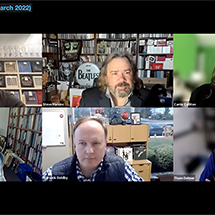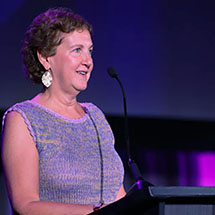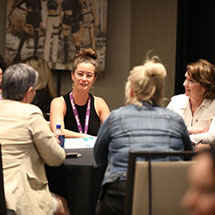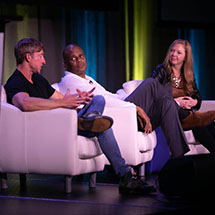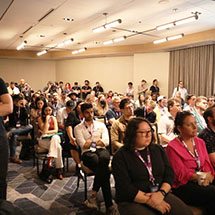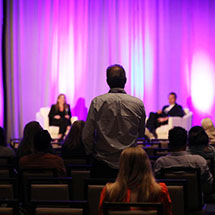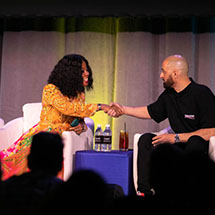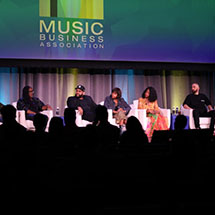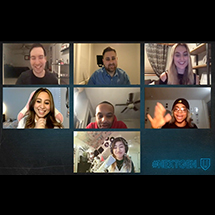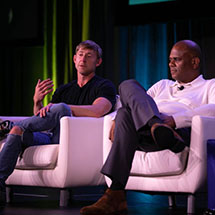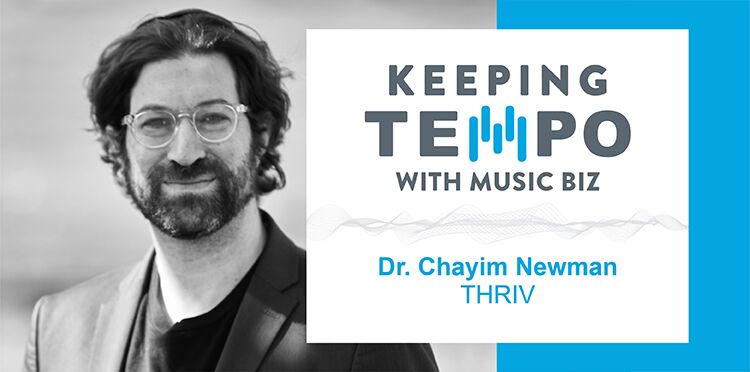
[Keeping Tempo With Music Biz] — A Conversation on Mental Health in the Music Business with THRIV’s Dr. Chayim Newman

The global conversation behind mental health has dramatically changed over the past decade, with a greater focus than ever on elevating the voices of those in crisis and ensuring that resources are available to them. Our industry — one where artists spend most of their time sharing music that bears their hearts both on record and on stage — is acutely affected by issues of mental health, as long, stressful stretches of studio and touring time takes away from artists’ ability to care for themselves and may not amount to enough income to make ends meet. On top of this reality, the ongoing COVID-19 crisis has effectively halted a number of major income streams for both artists and those who work with them in the live music sector.
We sat down with Dr. Chayim Newman, co-founder of the Tour Health Research Initiative (THRIV), to discuss his work in analyzing the unique mental health needs of the live music industry, how the COVID-19 crisis inspired virtual support groups for industry professionals, and what best practices we can utilize to care for ourselves at this time — both professionally and personally.
Music Biz: Can you talk about the genesis for the THRIV initiative? How did this program get off the ground?
CN: THRIV officially launched in the summer of 2019, though its foundations were being dug well before then. In my clinical practice as a psychologist, I had been working with artists primarily, but also with some crew members and industry professionals for years. THRIV co-founder Ryan George, through his organization This Tour Life had spent years thinking about and writing about mental health for touring crew. We were then introduced by a mutual friend and wonderful lighting designer (love ya, Matt Greer!).
The early discussions were mostly about the development of larger-scale interventions to provide mental health support to touring teams. We quickly realized that in order for interventions to be effective they had to be evidence-based and built around hard data, rather than just based on our intuition or limited personal experience.
Unfortunately too much of the mental health discussion in the music industry, and the mushrooming organizations trying to provide mental health services to artists and crew, base their understanding of the root issues. And their clinical approaches to address these issues are based on anecdotal evidence and personal experience, with no actual evidence or empirical research for support. I mean, you wouldn’t take a pharmaceutical medication if there was no research or scientific data to suggest it was helpful rather than harmful. Similarly, we do an injustice to those in the industry by trying to address their mental health needs without a proper scientific understanding behind it.
We at THRIV therefore pivoted from developing interventions to the necessary earlier step, which no one has ever really done properly, of the labor-intensive research programs to collect scientific data on health and mental health in the industry.
Music Biz: What would you say is the scope of this survey, and has anything comparable preceded the work THRIV is involved in?
CN: There have been a handful of smaller studies done previously, namely one in the UK and one in Australia that I’m thinking about. And those were really good first forays into collecting scientific data about the experience of working in the music industry. We’re working on greatly increasing the scope of the research in a number of ways. The first THRIV study (The Touring Health & Wellness Survey) is a global survey, open to touring professionals around the world. We’re looking to understand the unique experiences of both performers and crew members (previous studies tend to focus just on the artists). And the size of the Survey, in terms of respondents, is much larger than any previous research that’s been conducted.
Most significantly though, the Survey is incredibly comprehensive and asks questions about almost every aspect of the touring experience, which will hopefully give us a really thorough, data-driven understanding of what are the key factors impacting the health and mental health of those who tour as a career.
Music Biz: What end goals does THRIV hope to achieve with the data they collect?
CN: Data is a tool, used for decision-making, for policy development, and for designing clinical interventions that work. In a nutshell, data is a tool for change. As our research endeavors expand and the data comes in, we hope that the data will become a catalyst for positive change and the improvement of the health and mental health experience in the industry.
Results will be disseminated through publication in scientific journals and industry media outlets. And we’ll use the data to develop effective clinical interventions that can be delivered to touring parties to help them tour in a more health-sustainable way. Hopefully, the organizations driving the music industry — from record labels to management companies to the big promoters like Live Nation — will take the Survey results seriously and consider implementing the resultant recommendations that may go a long way towards improving the lives of those they’re sending out on the road.
Music Biz: The survey first launched in February of this year — how is the data collection process coming? And has the COVID-19 health crisis affected this process at all?
CN: Great question. This current health crisis is something we’ve all had to adapt and respond to, and no one is unaffected. We opened data collection for the Survey officially on Feb 2nd. And we had planned to collect data through June 2, with a target of 4,000 to 5,000 total participants. Within our first three weeks, we had about 1,000 respondents complete the survey, which was really exciting. And then COVID-19 hit.
We made a conscious decision to unofficially pause data collection for two reasons: We were worried that people’s initial emotional destabilization might influence their responses to the survey questions, and we felt that our resources as an organization could be better used in this period of crisis and suffering to support the acute mental health needs of the music community. What that turned into was a THRIV co-sponsored, twice-weekly support group which I co-lead with good friend and great clinician Zack Borer from Backline.Care, that is free for all individuals in the music industry. The program has been running for six weeks now and has had more than 500 participants. It also led Ryan to pen a series of articles which are helping crew members find their way emotionally and financially during this trying time.
As people are settling into the “new normal,” we’re now beginning to re-promote the survey and to ramp up the data collection again. While many touring professionals have abruptly found themselves with a lot of downtime, it’s the perfect opportunity for them to lend their voice and experience to improving the industry by spending 30 minutes taking the survey.
Music Biz: What does the timeline for rolling out results from the survey look like going forward?
CN: We’ll probably push the whole timeline back by a few months, given the circumstances in the world at the moment. Which likely means data collection will continue through the summer, and that we’ll begin to analyze, write up and publish the results towards the end of 2020.
Music Biz: Are there any preliminary insights from your research that you feel are worth sharing at this point? (Feel free to not answer this question)
CN: We had a rowdy internal debate within the THRIV team about looking at preliminary results. Swayed by internalized childhood messages from our parents, who yelled at us for peeking at Christmas or Chanukah presents before they were handed to us, we’ve decided to wait until the majority of the data collection is completed before we begin to analyze results. Which is a formidable undertaking — not quite the click of a few buttons. We already have over 200,000 data points to make sense of, and we’re hoping to still have thousands more respondents complete the survey.
Music Biz: Has the COVID-19 situation impacted anything in the way of questions asked in the current survey, or opened a door to further research regarding the effect situations like this have on the live business?
CN: Also another great question. Once the Survey launches, you can’t change the questions you’re asking, or you’ll muddle the data if different people are responding to different survey versions. So the Survey remains as it is, though many of the questions it asks are incredibly pertinent, and unintentionally poke at some of the key things that touring personnel are currently struggling with: questions around financial security (or lack thereof), questions about post-touring future, questions around self-care at home, and those sorts of things.
It would be immensely valuable to conduct a separate survey, once the crisis resolves, looking at the impact of the crisis on the mental health of those in the industry (and, really, such research is going to be badly needed in the general populace as well). Will we be the ones to conduct that research? That remains to be seen. We’re certainly thinking about it. Though, like with everyone else, future directions are up in the air until we’re closer to the end of the tunnel.
Music Biz: You mentioned earlier THRIV’s “Come Together” Zoom series, the bi-weekly support groups for music industry professionals. Can you share with us how this series came to be?
CN: As this crisis began to develop, we recognized in our weekly THRIV team meetings that we needed to use our resources to support the individuals in the industry during perhaps the most challenging period of our lifetimes. And that support needed to be in an acute and immediate way. Also, we were being contacted and encouraged by many in the industry to take a leadership role in supporting mental health during the crisis.
In a few conversations with Zack from Backline.Care, he and I landed on the idea of running online support groups to give individuals in the industry a platform to share their emotions and support each other, to feel like they weren’t struggling alone in this. We originally planned for two sessions. When the response was overwhelmingly positive and it was clear that the crisis wasn’t going to have a quick fix, we decided to make it an ongoing endeavor. And “Come Together” was born.
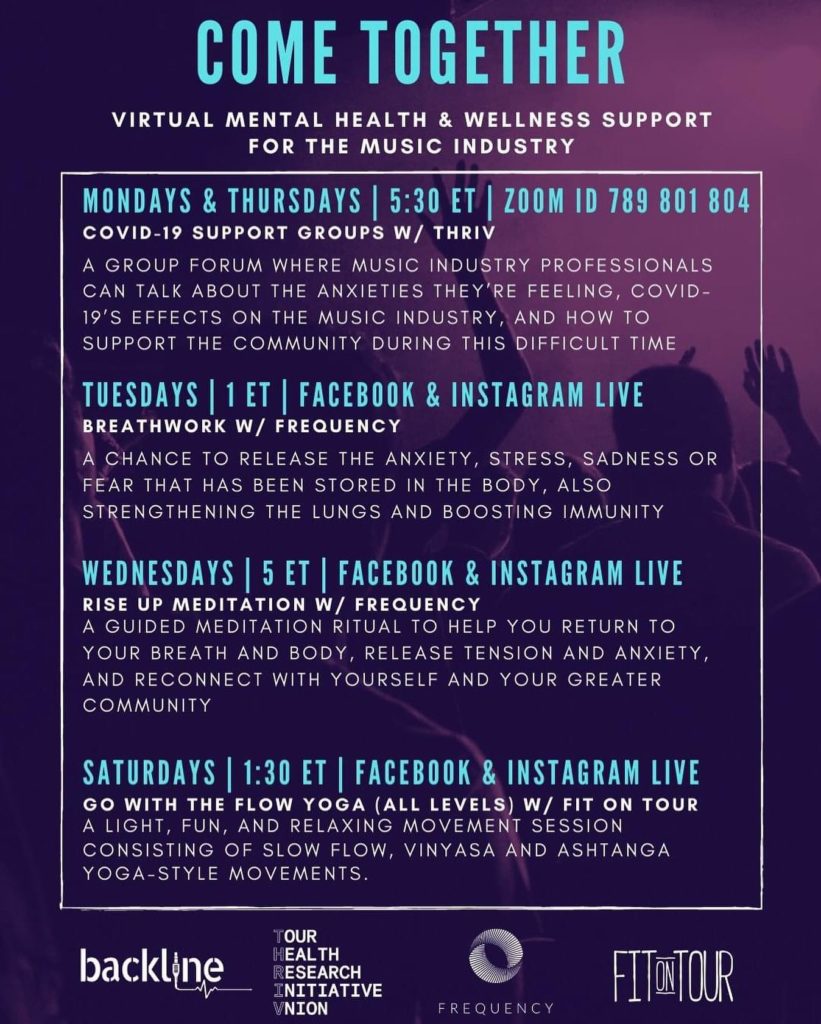
Music Biz: Has there been a general theme to each session or have they served more as an open forum?
CN: We really try to leave it open-ended. Themes tend to emerge organically, as many people seem to be going through the same issues simultaneously, but we don’t come in with a set theme for a given session. Some days, participants might end up sharing about the emotional ups and downs, other days it’s about relationship challenges or loneliness or fear for the future. People have felt safe opening up more and more as the weeks go by. Which is really special and powerful to witness.
Music Biz: While the survey and research is focused on players in the live music industry (artists, crew members, engineers, etc.) the “Come Together” sessions are open to all types of industry pros. What does the rough breakdown of industry segments attendees hail from look like?
CN: Honestly, who attends changes from session to session. We have had artists big and small, crew and production members, venue staff, agents, managers, label personnel — you name it. The virus doesn’t differentiate and neither do we. If anything, it’s really special to watch participants come together from all parts of the industry to share their humanity and collective struggles with each other and to support and care for each other in a deep way.
Music Biz: What has the response been from folks who have attended the support groups?
CN: It’s been an overwhelmingly positive response. We hear about it on social media all the time. And I think the real evidence is that we now have a core group that attend every session, twice a week. The groups have become an emotional anchor or a de-facto kind of family for some people. Which is what we had initially hoped to be able to provide.
Music Biz: Have there been insights or perspectives shared during these sessions you think our readers would benefit from?
CN: We’ve witnessed so many powerful moments in the ten group sessions that have run so far. And in truth, it’s the power of the group and the support that is the real benefit, much more than any one particular insight or idea.
That being said, some of the key perspectives that seem to come up repeatedly are:
- Allowing ourselves to accept and feel whatever emotion may present itself in a given moment, rather than pushing them away. There’s no particular way anyone is SUPPOSED TO feel during this. And if we fluctuate in a given hour from feeling confident and hopeful to crying in panic, all of that is reasonable and can be honored.
- Giving ourselves permission to be productive and to use this time to move our lives forward in creative ways we may not have otherwise, while recognizing that some days we may sit on the couch for hours unproductively and that’s ok as well. It truly is a marathon rather than a sprint.
- Recognizing that none of us are alone in this. And while we may be in our homes alone, we are in this struggle as a collective universal whole. It’s a powerful time to feel, in a deep way, bonded to those we may have never even met, who may be across the world from us, yet who are feeling the exact same things we are at this moment.
- Above all else, those who seem to be coping most effectively are the ones who are willing to accept the uncertainty and work within the present moment, rather than trying to figure out the unknowable answers to what’ll happen down the road.
Music Biz: Do you see a future life for these sessions when the COVID-19 crisis concludes?
CN: Not too sure, at this point. I guess it’ll depend on if the individuals attending continue to find benefit from the groups. There’s real power in community, and there’s never been a centralized community for mental health and emotional support within the music industry. MusiCares does wonderful work with helping struggling individuals, but doesn’t engage in bottom-up development of community or providing a destination for industry folks to come together to connect and support each other. Perhaps THRIV will ultimately become that community.
Music Biz: To conclude, can you share any advice or best practices for everyone — whether a touring professional or not — to help them stay on top of their mental health during this trying time?
CN: There are lots of good resources circulating out there on self-care during this time, all of which can be helpful. I’m encouraging all my patients in two directions.
- Differentiate between that which we can control and that which we can’t. We can’t control when this is going to end, or whether something bad will happen to someone we know, or what our governments may do, etc. etc. But what we CAN control is how we take care of ourselves physically during this time, how we give selflessly to those around us, and how we process the emotions that may surface. Lean into those things.
- Find ways to make meaning out of the experience. If we as humanity emerge from this crisis only to fall right back into the same divisiveness, selfishness, consumerism and escapism we were caught in previously, that will be the true tragedy. However, there is meaning in this moment. The world has a profound opportunity to use this period to introspect and to commit to better, values-based living in our self-care, our relationships, and our emotional and spiritual lives. It’s worth each of us spending some time figuring out what that means for us.
And one last thing, Mark Foster from Foster the People wrote a brilliant and profound piece about this time period we’re living through. Can’t recommend it enough. You can still find it on the band’s homepage at fosterthepeople.com
Love to all. Wishing everyone a lifetime of good physical health and good emotional health. We’re stronger than we think we are.
If you are in crisis or are experiencing thoughts of suicide, please call the National Suicide Prevention Lifeline at 1-800-273-8255, text “talk” to 741-741, or visit your nearest hospital emergency room. For more resources, please visit the American Foundation for Suicide Prevention’s website at afsp.org/findsupport.
For more info about the Tour Health Research Initiative, as well as the link for the survey, visit their website. You can read past “Keeping Tempo ” articles via the portal linked here. And, stay tuned for more insightful discussions from our members and partners from across the industry!

